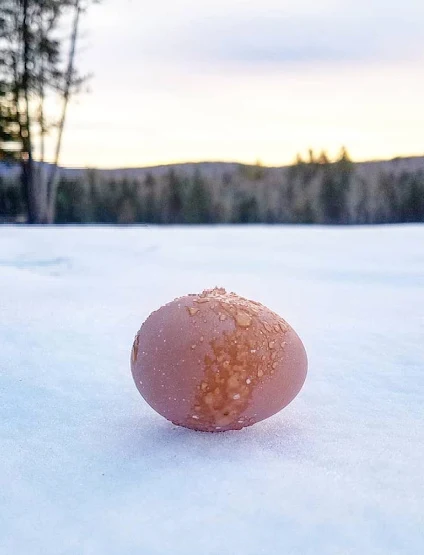How Do I Keep my Chicken Eggs from Freezing?
Eggs left out in your coop uncollected during the winter months can freeze and crack.
Are they still safe to eat? What if an egg is frozen, but not cracked?
How Do I Keep my Chicken Eggs from Freezing?
Here is some advice on handling frozen chicken eggs, as well as tips to attempt to keep your eggs from freezing in the first place.
Preventing Frozen Eggs
- Collect your eggs as often as possible during the day. If you work all day, maybe enlist a neighbor to check for eggs several times a day.
- If you have a broody hen, consider letting her sit – she’ll keep the eggs warm for you until you can collect them! She doesn't care whether she's sitting on fertile eggs or not.
- Hang curtains over your nesting boxes – they'll help retain heat inside the boxes - and can be as simple as a feed bag or piece of burlap over the front of the box or as fancy as you like. A heavier material left hanging straight down will retain more of the hen's body heat after she finishes laying than a lighter material pulled back.
- Use a thick nest of straw in the bottom of your boxes. Straw is a wonderful insulator because warm air is trapped inside the hollow shafts. If you normally use shavings, consider switching to straw for the winter months.
- Heating your coop is also an option, but one that I don’t recommend because of the risk of fire or loss of electricity.
- Hang a light bulb over your nesting boxes. Often the heat a regular bulb gives off will be enough to keep your eggs from freezing. Again, there's a risk of fire involved with any heat source.
- If your nesting boxes jut out from your coop, consider insulating the top, bottom and outer walls of the boxes, or packing bales of straw around them on the outside for the winter.
- Position your coop so the nesting boxes face east, so they are warmed from the rays of the rising sun.
Handling Frozen Eggs
- If an egg seems to be frozen, but has not cracked, go ahead and refrigerate it. It should be perfectly fine to eat after it defrosts.
- If the egg is cracked, but the membrane seems intact and the egg isn’t visibly dirty, you can still use it, but cook it up right away (be sure to cook it well).
- If the egg is cracked, the membrane broken and the white oozing out, I would toss it. There is too much risk that bacteria has entered through the cracked shell and broken membrane.
- If you can't bear to throw an egg away, scramble it up, cook it really well and feed it to your chickens or your dogs. It's a nutritious treat, and their stomachs and digestive tracts are better able to handle bacteria than a humans are.
Should Frozen Eggs Be Refrigerated?
While unwashed eggs from your chickens can generally be left out on the counter at room temperature for several weeks without being refrigerated because of the protective bloom that covers them and helps keep out air and bacteria, condensation on an egg removes the bloom.
So....during the winter, if your coop gets to below 45 degrees or so, and the eggs are very cold to the touch when you collect them, they should be refrigerated at soon as you get back to the house, since being out in the cold is equivalent to being chilled in the refrigerator.
If you bring them inside and leave them on the counter, condensation will most likely form on the shell, rendering the bloom ineffective.
I don't recommend washing your eggs until just before you use them. That goes for potentially frozen eggs as well.
Eggs become a precious commodity in the winter for most of us since production usually drops off, so no one wants any to go to waste.
Hopefully these tips will help prevent frozen or cracked eggs.
One Last Tip to Keep Eggs from Freezing
And one last suggestion - think about adding some ducks to your flock
Ducks not only tend to lay their eggs just before dawn, so you can collect them when you open up the coop before heading off to work, they also like to cover them up with straw and hide them, which helps to insulate the egg and keep the warmth in longer.
In all my years raising chickens, I have endured a few frozen chicken eggs, but never a frozen duck egg.






.jpg)





















